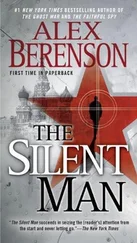Alex Berenson - The Midnight House
Здесь есть возможность читать онлайн «Alex Berenson - The Midnight House» весь текст электронной книги совершенно бесплатно (целиком полную версию без сокращений). В некоторых случаях можно слушать аудио, скачать через торрент в формате fb2 и присутствует краткое содержание. Жанр: Шпионский детектив, на английском языке. Описание произведения, (предисловие) а так же отзывы посетителей доступны на портале библиотеки ЛибКат.
- Название:The Midnight House
- Автор:
- Жанр:
- Год:неизвестен
- ISBN:нет данных
- Рейтинг книги:3 / 5. Голосов: 1
-
Избранное:Добавить в избранное
- Отзывы:
-
Ваша оценка:
- 60
- 1
- 2
- 3
- 4
- 5
The Midnight House: краткое содержание, описание и аннотация
Предлагаем к чтению аннотацию, описание, краткое содержание или предисловие (зависит от того, что написал сам автор книги «The Midnight House»). Если вы не нашли необходимую информацию о книге — напишите в комментариях, мы постараемся отыскать её.
The Midnight House — читать онлайн бесплатно полную книгу (весь текст) целиком
Ниже представлен текст книги, разбитый по страницам. Система сохранения места последней прочитанной страницы, позволяет с удобством читать онлайн бесплатно книгу «The Midnight House», без необходимости каждый раз заново искать на чём Вы остановились. Поставьте закладку, и сможете в любой момент перейти на страницу, на которой закончили чтение.
Интервал:
Закладка:
“Ellis Shafer,” Murphy said. He had a clipped Yankee accent, a relative rarity at the agency, which recruited more from the South and Midwest.
“Good to meet you,” Shafer said. “I appreciate this.”
“The pleasure is mine,” Murphy said. He didn’t look pleased. “If the director asks, I’m glad to accommodate. And of course your reputation precedes you.”
“Follows me, too.”
Murphy led them into a high-ceilinged conference room, the walls of which were lined with expensive black-and-white photographs of Iraq and Afghanistan.
“Nice digs.”
Murphy looked around as if he’d never seen the photos before. “You spend as much time in here as we do, you hardly notice.”
“Just like Poland?”
“Not exactly, but sure.”
Shafer set a digital tape recorder on the table. “Do you mind?”
“And here I thought this was a social call. You don’t mind, I’d prefer we keep it informal.”
The room itself was almost certainly wired, but Shafer didn’t argue. He slipped the recorder away, reached into his pocket for a pen and a reporter’s notebook, its pages filled with an illegible scrawl.
“Tell me how you became part of 673.”
“Have you seen my file?”
Shafer grunted noncommittally.
“So, you know a couple years back I did a tour in Iraq. Mosul. My COS”—chief of station—“there was Brad Gessen. Remember him?”
“Yeah.” Gessen had been arrested for stealing 1.2 million dollars from a fund used to bribe Sunni tribal chiefs in Iraq. Starting in early 2006, the CIA and army had thrown cash at the tribes, hoping to turn them against the insurgency, or at least buy their neutrality. More than one billion in cash was distributed through the program, with only the barest accounting. Rumors of thefts were rampant. But only Gessen had been arrested, probably because he’d stolen so much money that some of the tribal leaders had complained to the army about the missing payments.
“Brad and I were tight,” Murphy said. “I mean, I had no idea what he was up to—”
“Sure about that?”
“I don’t appreciate that question.”
“One-point-two million, and the guy was your boss and you didn’t know?”
Murphy controlled himself, the effort visible. “There was a full investigation. The IG cleared me. But my career took a hit. Started hearing that I might get moved to Australia”—not exactly the agency’s hottest theater. “So 673, when it came up, I figured it was a chance to turn the page. High-risk, high-reward, but we get the right intel, we’re all heroes.”
Shafer started to like Murphy a tiny bit more. The man hadn’t sugarcoated this explanation. No talk of taking the battle to the enemy, broadening his experience. He’d made a clear-eyed analysis that going to Poland might rescue his career. He was a hopelessly ambitious careerist, but at least he wasn’t pretending otherwise.
“And what did you do in Poland?”
“Ran admin and logistic,” Murphy said, calm again. “Nine-person unit on a foreign base, plus the detainees, there’s a lot to do.”
“Thought it was ten.”
“I’ll get to that. I handled our relationships with the Poles, set up the supply chain. When there was significant intel, I summarized it and passed it to the Pentagon.”
“With so few men, how did you watch the prisoners continuously?”
“We had help from the Poles. They supplied food, picked up garbage, handled security around the building. At night they helped us monitor the cells.”
“But they weren’t actively involved in the interrogations.”
“No.”
“How often did you visit the detainees?”
“When necessary,” Murphy said. “Like I said, it wasn’t my role.”
“And how were they treated?”
“As illegal enemy combatants. If they cooperated, they received more privileges, and if they didn’t, they didn’t.”
“I’m sorry,” Shafer said. “I didn’t hear an answer.”
“I told you, I spent most of my time on admin.”
“The unit was short on manpower,” Shafer said. “You were basically running a jail with a ten-man squad.”
“Yes and no,” Murphy said.
“How many detainees did you have?”
“Ten.”
“And you’d hold one or two at a time?”
“Yes. Once we had three, but Terreri didn’t like that. Said it was too many. And he was right.”
“Walk me through a day in the life.”
“The interrogations ran about eight, ten hours at a stretch. Two or three men were involved: the interrogator — that was usually Karp — and a muscle guy or two.”
“So you could run two interrogations at once.”
“If we needed to. But we preferred to go one at a time. As you know, the squad was all men, except for the psychiatrist, Rachel, Dr. Callar. The org chart, LTC Terreri was the CO”—the commanding officer. “I was XO”—the executive officer, the number two. “Karp was the lead interrogator. Jerry Williams did swing duty; he knew Arabic, so he could handle interrogations. And also he oversaw the three Rangers, who were the muscle. And then Callar.”
“What about Hank Poteat?”
“He was technically part of the squad, but he was only there a couple of months, at the beginning. He helped set up our coms, and then he left. So that’s everybody.”
“It isn’t, though,” Shafer said. He flipped back through his reporter’s notebook. “CO is Terreri. XO is you. Karp is the interrogator. Callar’s the doctor. Williams and his three Rangers make eight. Poteat counts as technically part of the squad, even though he wasn’t there long. That’s nine. You forgot Jack Fisher.”
“Right,” Murphy said. “Fisher helped Karp with the interrogations. He would stay up late with the prisoners. If they wouldn’t talk, they needed an extra push. Sometimes Jerry Williams helped. The Midnight House, we called it sometimes. Fisher, he’d tell the detainees when they got there, ‘Welcome to the Midnight House.’ ”
“Funny.”
“We were trying to take the edge off. Stuck in Poland for a year and a half.”
“How tough was Fisher?”
“I don’t know. Specifically.”
“Friendly persuasion. Cup of cocoa. Tell me about your mother.”
“I wasn’t there.”
“You were the second-in-command and you didn’t know.”
“I told you, I wasn’t operational.”
“You strike me as the type who prefers to lead from the rear.”
Murphy stared at Shafer as if Shafer were a misbehaving brat he wanted to spank but couldn’t. In turn, Shafer made faces at Murphy, raising his eyebrows, throwing in a wink.
“I’m sorry,” Murphy said finally. “I didn’t hear a question.”
“Try this. Did the unit have internal tensions?”
“We were a small group living in close quarters in a foreign country. We couldn’t tell anyone what we were doing. Of course, we didn’t always get along. But nothing you wouldn’t expect.”
“Did you believe that the detainees were treated fairly?”
“From what I saw, yes.”
“Did 673 ever uncover actionable intel?”
For the first time, Murphy smiled. “Definitely.”
“What, exactly?”
“I can’t say. Vinny Duto wants to tell you, it’s his business.”
“But it was valuable.”
“You could say that.”
Shafer made a note. “Fast-forward,” he said. “The squad breaks up, a bunch of guys retire. You stay.”
“With the intel we’d gotten, I wanted to see where I’d be in a year or two.”
“Any idea why so many guys decided to leave?”
“Ask them.”
“Guilty consciences?”
“I’m not a mind reader. Not now or then.” Murphy looked at his watch. “The FBI’s coming tomorrow, and I’m sure they’ll be asking all the same questions as you, and more besides. Can we finish up later?”
Читать дальшеИнтервал:
Закладка:
Похожие книги на «The Midnight House»
Представляем Вашему вниманию похожие книги на «The Midnight House» списком для выбора. Мы отобрали схожую по названию и смыслу литературу в надежде предоставить читателям больше вариантов отыскать новые, интересные, ещё непрочитанные произведения.
Обсуждение, отзывы о книге «The Midnight House» и просто собственные мнения читателей. Оставьте ваши комментарии, напишите, что Вы думаете о произведении, его смысле или главных героях. Укажите что конкретно понравилось, а что нет, и почему Вы так считаете.












